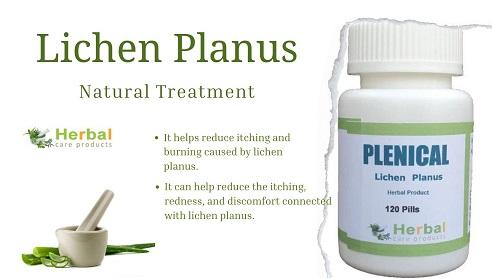Lichen planus is a condition that affects the skin and mucous membranes, characterized by purple, itchy, flat-topped bumps. While the exact cause of lichen planus remains unclear, it is believed to be an autoimmune response. Many individuals seek ways to manage and alleviate the symptoms of this condition naturally. In this article, we’ll explore effective methods to relieve lichen planus naturally, along with helpful tips and tricks, including specific Supplements for Lichen Planus that can support your healing journey.
Lichen Planus
Before diving into natural remedies, it’s essential to understand lichen planus better. This condition can manifest as:
- Skin lesions: Typically appearing on the wrists, ankles, and lower back.
- Oral lichen planus: Presenting as white patches or sores in the mouth.
- Nail involvement: Leading to thinning or loss of nails.
Symptoms can vary in severity and may include itching, burning, and discomfort. While conventional treatments often involve corticosteroids or other medications, many individuals prefer to explore natural remedies to complement their treatment or alleviate symptoms.
Natural Remedies for Lichen Planus
For those with lichen planus, natural remedies can provide relief and may help manage symptoms when used alongside medical treatments. While these remedies don’t cure lichen planus, they can help reduce discomfort. Always check with a healthcare provider before starting new treatments to ensure safety.
1. Dietary Changes
Dietary changes can be helpful in managing lichen planus symptoms, as certain foods may trigger inflammation or irritation, especially for those with oral lichen planus. Here are some key dietary tips:
Dietary Recommendations for Lichen Planus
- Avoid Acidic Foods:
-
- Examples: Citrus fruits (like oranges, lemons, grapefruits), tomatoes, vinegar-based products.
- Why: Acidic foods can worsen irritation, especially for oral lichen planus, as they can sting or increase mouth sores.
- Limit Spicy Foods:
-
- Examples: Hot peppers, spicy sauces, curries, chili powder.
- Why: Spicy foods may increase inflammation and worsen mouth sores or skin irritation, especially if the sores are open.
- Reduce Sugary Foods:
-
- Examples: Sweets, candy, sugary drinks, and high-sugar desserts.
- Why: High-sugar diets can contribute to inflammation and increase the risk of infections, which may aggravate lichen planus symptoms.
- Avoid Potential Allergens:
-
- Examples: Foods like gluten (wheat), dairy, soy, and nuts may trigger sensitivities in some people.
- Why: Food sensitivities can lead to flare-ups, so it might help to avoid these if you suspect they are a trigger for you. A food journal can help identify patterns.
- Limit Alcohol and Caffeine:
-
- Why: Alcohol and caffeine can dehydrate the body and potentially irritate mucous membranes, worsening symptoms of oral lichen planus.
2. Stress Management
Managing stress is essential for individuals with lichen planus, as stress can trigger or worsen symptoms. Implementing stress management techniques can help reduce flare-ups and improve overall well-being.
Effective Stress Management Techniques
- Mindfulness Meditation:
-
- How it helps: Mindfulness meditation encourages being present, which helps reduce anxiety and stress.
- How to practice: Spend 10–15 minutes daily focusing on your breath, letting go of distracting thoughts. Apps like Headspace or Calm can guide you through meditation exercises.
- Deep Breathing Exercises:
-
- How it helps: Deep breathing activates the body’s relaxation response, calming the mind and reducing stress hormones.
- How to practice: Try deep belly breathing by inhaling slowly through your nose for a count of four, holding for four, and exhaling through your mouth for four. Repeat for several cycles.
3. Herbal Remedies
Several herbs may offer soothing properties for lichen planus:
- Turmeric: Known for its anti-inflammatory properties, turmeric can be consumed as a spice or taken as a supplement.
- Aloe vera: This plant has soothing properties and can be applied topically to affected areas for relief from itching and irritation.
- Chamomile: Often used in tea, chamomile can help reduce inflammation and promote relaxation.
4. Essential Oils
Certain essential oils may provide relief from symptoms of lichen planus. When used correctly, they can soothe itching and inflammation:
- Tea tree oil: Known for its antimicrobial and anti-inflammatory properties, diluted tea tree oil can be applied to the skin.
- Lavender oil: This oil has calming effects and may help alleviate discomfort.

5. Supplements for Lichen Planus
In addition to dietary adjustments, certain supplements can aid in managing lichen planus symptoms. Here are some effective options:
- Omega-3 fish oil: As mentioned earlier, omega-3s are known for their anti-inflammatory properties, making them a suitable supplement for lichen planus.
- Vitamin D: This vitamin plays a crucial role in immune system regulation. Consider getting your levels checked and supplementing if necessary.
- Zinc: Known for its immune-boosting properties, zinc supplements may help improve skin health.
6. Proper Skincare Routine
Taking care of your skin can make a difference in managing lichen planus. Here are some tips:
- Gentle cleansers: Use mild, fragrance-free cleansers to avoid irritation.
- Moisturizers: Keeping your skin hydrated can prevent dryness and itching. Look for products containing natural oils like coconut or jojoba oil.
- Avoid triggers: Identify and avoid any personal triggers that may worsen your condition, such as certain fabrics or skincare products.
7. Consult with Professionals
While natural remedies can be beneficial, it’s essential to consult with a healthcare professional before making significant changes to your treatment plan. A dermatologist or naturopath can help you find the right combination of natural treatments and supplements for lichen planus.
Conclusion
Relieving Lichen Planus Treatment Natural involves a multifaceted approach, including dietary changes, stress management, herbal remedies, and specific supplements for lichen planus. By adopting these tips and tricks, you can support your body’s healing process and potentially alleviate symptoms. Remember, it’s essential to consult with a healthcare professional to tailor a treatment plan that best suits your individual needs. Embracing a holistic approach can lead to a more balanced and healthier lifestyle while managing lichen planus effectively.



